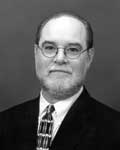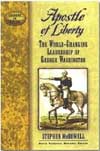by David J. Vaughan During a recent trip to Mount Vernon, my wife and I visited the nearby gift shop. As I browsed through the many books on Washington and colonial life, I was struck by the lack of attention given to Washington’s religious faith. Only a few books seemed to suggest that religion was an important part of Washington’s life. Most suggested that he was either a deist or a lukewarm Anglican whose religion was primarily for public consumption.
During a recent trip to Mount Vernon, my wife and I visited the nearby gift shop. As I browsed through the many books on Washington and colonial life, I was struck by the lack of attention given to Washington’s religious faith. Only a few books seemed to suggest that religion was an important part of Washington’s life. Most suggested that he was either a deist or a lukewarm Anglican whose religion was primarily for public consumption.
For instance, historian Gordon Wood stated: “It is true that many of the distinguished political leaders of the Revolution were not very emotionally religious. At best, they only passively believed in organized Christianity and at worst they scorned or ridiculed it. Most were deists or lukewarm churchgoers and scornful of religious emotion and enthusiasm. Washington, for example, was a frequent churchgoer, but he scarcely referred to God as anything but ‘the Great Disposer of events’ and in all his voluminous papers he never mentioned Jesus Christ.” Such is the accepted wisdom’ of the academy.
What is shocking about this statement however is that everything asserted here is either false or only partly true. First Washington and the other Founders were predominantly religious men. Of the fifty-two delegates to the Constitutional Convention, twenty-eight were Episcopalians, eight were Presbyterians, and there were two each of Congregationalists, Lutherans, Dutch Reformed, Methodists, and Roman Catholics. Oh yes, there were three deists—at best. Washington, of course, was an Episcopalian his entire Life, regularly attended church, served as a vestryman (church trustee) and regularly donated generous sums to support a number of churches. While in the military, he often conducted worship services when a chaplain was not available. This is hardly a “passive” belief in organized Christianity.
Not only did Washington never scorn or ridicule Christianity, but while serving in the military he would not permit any under his command to show the least disrespect for God or Christianity. As he said in a September 14, 1775 letter to Col. Benedict Arnold: “I also give it in Charge to you to avoid all Disrespect to or Contempt of The Religion of the Country [Canada] and its Ceremonies. Prudence, Policy and a true Christian Spirit, will lead us to look with compassion upon their Errors [in doctrine] without insulting them. While we are contending for our own Liberty we should be very cautious of violating the Rights of Conscience in others, ever considering that God alone is the Judge of the Hearts of Men and to him only in this Case, they are answerable.”
While Washington observed his religious duties, he encouraged his troops do likewise. Consider his general order for May 15 1776: “The general commands all officers, and soldiers, to pay strict obedience to the Orders of the Continental Congress and by their unfeigned, and pious observance of their religious duties, incline the Lord, and Giver of Victory, to prosper our arms.”
Notice Washington’s use of “Lord” and “Giver of Victory.” Throughout his writings and speeches, Washington used a variety of names for God (not simply Wood’s claim of “Great Disposer of Events”) including “Almighty,” “Almighty God,” “Father of All Mercies,” “Creator,” “Gracious God,” “Jehovah,” “Lord” (Sic.) and “Wonder-working Deity.” And, oh, yes, he called God “Jesus Christ.” In a May 22, 1779, speech to the Delaware chiefs Washington said: “You do well to wish to learn our arts and ways of life and above all the religion of Jesus Christ. These will make you a greater and happier people than you are.”
As for Washington’s lack of religious emotion (that is the claim that he was “lukewarm”), one does not have to be a fanatic to be sincere. In fact, not only was his denomination High Church, but Washington was also temperamentally reserved. In addition, he was a polished gentleman who believed excessive displays of emotion (about anything not just religion) were an inappropriate breach of decorum. Washington actually tried to live by the rules of civility that he penned as a young man. Religious emotion (a better word is conviction) need not be extreme to be deep and sincere. As Chief Justice John Marshall who knew Washington, said: “Without making ostentatious professions of religion, he was a sincere believer in the Christian faith and a truly devout man.”
That a secular historian, who has no personal experience of religious faith should presume to judge the depth of a man’s religious devotion is a very telling example of humanistic hubris. Yet it only goes to show that in history, as in love, beauty is in the eye of the beholder. In other words, we often see that which is most agreeable to our own inclinations. So I suppose given the secular bent of the modern (or should I say postmodern) intellectual class we should not be surprised that Washington’s religious faith is often downplayed or ignored.
Thankfully, however we have Stephen McDowell’s work in hand to set Washington’s religious faith in the context of his multifaceted life. You will discover that from his earlier days as a surveyor, to his military career, to his attainment of the highest office in the land Washington was guided by a profoundly religious view of life. He not only attended church, but Washington faithfully performed private devotions where he meditated on the Scriptures and prayed while on his knees (not very lukewarm to me). He sought God’s guidance and protection, and from all the accounts of his military battles, he received it. He sought God’s glory, and from his example as a gentleman, a statesman, and a Christian, he rendered it.
 Contrary to the false picture of Washington that now prevails in the academy, through reading McDowell, you will come to know and honor the Washington that our forefathers knew and loved. And knowing him, you will have before you one of the finest examples of leadership the world has ever known—an example worthy of both your admiration and emulation. As Abigail Adams said of him: “No man ever lived more deservedly beloved and respected…If we look through the whole tenor of his Life, History will not produce to us a Parallel.”
Contrary to the false picture of Washington that now prevails in the academy, through reading McDowell, you will come to know and honor the Washington that our forefathers knew and loved. And knowing him, you will have before you one of the finest examples of leadership the world has ever known—an example worthy of both your admiration and emulation. As Abigail Adams said of him: “No man ever lived more deservedly beloved and respected…If we look through the whole tenor of his Life, History will not produce to us a Parallel.”
Copyright © 2007. Used by permission.


No comments yet.